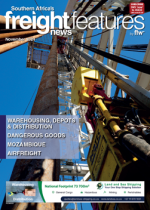In a strategic move to strengthen its logistics capabilities, ZACPAK has made a major investment in its own f leet, enabling the delivery of comprehensive first- and final-mile services. This initiative, which has kicked off in Durban, is designed to provide tailored solutions, ensuring reliable, efficient and timely delivery from transportation hubs to end customers"This investment in our f leet allows us to bridge the crucial gap in logistics, offering seamless connectivity and superior service quality," said Riaz Ismail, national operations manager. "By optimising our f leet operations, we are committed to driving value for our clients, while maintaining a competitive edge in the market and adapting to the evolving demands of the logistics landscape."He said while the company maintained an overall positive outlook for the warehousing sector, staffing remained a significant challenge. “Finding and retaining skilled workers can be difficult, leading to higher operational costs and reduced efficiency,” he said. "Rising operating expenses, including rent, utilities and labour, continue to put pressure on profit margins."He also pointed out the challenges related to evolving technology, particularly when integrating new systems, and the impact this has on inventory management, whether goods are stationary or in transit.“It’s cr itical to comply w ith safet y, health, and environmental regulations, which makes ongoing staff training a key investment for the company,” he added. "In South Africa, we also face several security concerns, with cargo damage being a significant issue. The rise in cyber threats has further heightened the need for the company to remain vigilant, making it crucial to safeguard both physical assets and digital infrastructure."According to Ismail, South Africa’s warehousing sector is highly competitive on a global scale, though it lags slightly in automation. “Expensive labour has an impact on operations, affecting overall cost efficiency,” he said.Commenting on trends in distribution, Ismail highlighted the growing focus on improved operational control, which prompted the company to invest in its own f leet. “Owning a f leet allows for greater control over delivery schedules, routes, and service quality, which leads to enhanced customer satisfaction," he explained. "While there are upfront costs, having a dedicated f leet reduces reliance on third-party carriers and can potentially lower long-term transportation expenses.”The new f leet also offers increased f lexibility, enabling the company to quickly respond to changing demand, seasonal f luctuations, or special projects without having to negotiate with external providers. “Having our own vehicles ensures consistent service quality, minimises delays caused by third-party logistics issues, and strengthens our brand’s reputation as a reliable and professional service provider,” he added. Additionally, Ismail noted the environmental benefits of f leet ownership. “You can choose to invest in eco-friendly vehicles, enhancing your commitment to sustainability and potentially lowering your carbon footprint," he said.By integrating the f leet with existing operations, the company has improved coordination, reducing errors and boosting overall efficiency. “Owning the f leet also allows us to collect valuable data on delivery performance, which helps inform decision-making and drive operational improvements.” LV

